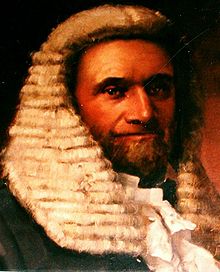Peter Lalor

Peter Fintan Lalor (Template:Pron-en, locally [ˈloːlə]; 5 February 1827 – 9 February 1889) was the leader of the Eureka Stockade rebellion, one of Australia's few armed uprisings and often characterised controversially as the "birth of democracy" in Australia.
Early Life
Peter was born in the family home of Tinakill, at Raheen County Laois, (then known as Queen's County), Ireland, the son of Patrick Lalor, a landowner and supporter of the abolition of tithes who held a seat in the House of Commons from 1832 to 1835. He was the first Catholic MP for Queens County, Ireland since the reign of James II. His mother was Anna Dillon, who had 11 sons of whom Peter Fintan Lalor was the youngest. His eldest brother was James Fintan Lalor. His mother died on 4 June 1835 and his father then married Ellen Mary Anne Loughnan with whom he had no children.
Lalor was educated at Carlow College then trained as a civil engineer at Trinity College, Dublin.
Australia
With his brother Richard, Lalor emigrated to Australia in October 1852. He initially worked on the construction of the Melbourne-Geelong railway line but joined the Victorian Gold Rush and began mining in the Ovens Valley, and then the Eureka Lead at Ballarat.
Lalor led the miners' opposition to the incompetent and often brutal administration of the goldfields, and was elected to lead the men in the armed uprising after the meeting on Bakery Hill. During the fighting he was wounded in the left arm, which was subsequently amputated. A warrant for Lalor's arrest for sedition was initially sought, but he was taken from Ballarat and hidden in the Young Queen Hotel at South Geelong by supporters. The warrant for his arrest was withdrawn in June 1855 after juries had found a number of other miners involved in the stockade not guilty of sedition.
As a result of the uprising a number of the miners' complaints were resolved. Legislation was passed to give miners the right to vote. A new form of licensing of Miners Rights costing £2 per year (later reduced to £1) was introduced. The monthly gold tax was abolished. A general amnesty for the 3 miners arrested after the Bentley's Eureka Hotel fire and the 114 arrested at the Eureka Stockade was proclaimed.
Due to the political changes caused by the Eureka Stockade, Lalor was appointed to the Victorian Legislative Council in 1855.[1] In 1856, under the new, more democratic constitution (featuring near-universal non Aboriginal, male suffrage) Lalor was elected to the Legislative Assembly seat of North Grenville (Ballarat West). In 1859 he transferred to the seat of South Grant[2], which he was to hold for the rest of his life.
He was postmaster-general (August to October 1875) and minister for trade and customs (May 1877 until March 1880) Sir Graham Berry.
As successor to Sir Charles Gavan Duffy, his most effective political post was probably that of Speaker , a post he held from 1880 until 1887 until illness forced his retirement; he was awarded a pension of 4,000 pounds by parliament.
He married Alicia Dunne on 10 July 1855 in Geelong. Their first child was their daughter Annie born in Prahran in 1856 and their son Joseph was born at Sandridge (now called Port Melbourne) on 18 December 1857. Annie married Thomas Lempriere in 1882 and died in 1885 of pulmonary phthisis aged 29 years. Joseph became Dr Lalor and married Agnes McCormick from Dublin, Ireland.[3]
Late life and legacy

Alicia died on 17 May 1887 aged 55 years. After her death, Lalor took leave from Parliament to travel to San Francisco. He died 18 months later at his son's home on 9 February 1889 aged 62 years.
The northern Melbourne suburb of Lalor is named for him, as is a federal electorate, the Division of Lalor, and Lalor House in Richmond where he lived. There is also a secondary school called the Peter Lalor Secondary College in Melbourne.
His grandson, Captain Joseph Peter Lalor born 12 August 1884 at Richmond, Melbourne carried the sword of his grandfather into the Battle of Gallipoli, Turkey on Sunday 25 April 1915; he died that day aged 30 years. He was survived by his wife Hester (née Loughrey) of Hawthorn.
Oath
Lalor was the author of the oath of allegiance used by the miners at the Eureka Stockade which he swore to their affirmation.
"We swear by the Southern Cross to stand truly by each other and fight to defend our rights and liberties"
Notes
- ^ "Lucky City: The First Generation at Ballarat 1851-1901" page 133, (Weston Bate, Melbourne University Press, 1978)
- ^ re-member - Parliament of Victoria
- ^ http://en.wikipedia.org/wiki/Peter_Lalor
References
Serle, Percival (1949). "Lalor, Peter". Dictionary of Australian Biography. Sydney: Angus & Robertson.
- Peter Lalor's pistol at the State Library of Victoria
- Ian Turner, 'Lalor, Peter (1827 - 1889)', Australian Dictionary of Biography, Volume 5, Melbourne University Press, 1974, pp 50–54.
Additional sources listed by the Australian Dictionary of Biography:
- W. B. Withers, The History of Ballarat (Ballarat, 1887); L. Fogarty (ed), James Fintan Lalor (Dublin, 1947); T. J. Kiernan, The Irish Exiles in Australia (Melb, 1954); Historical Studies, Eureka Supplement (Melb, 1965); C. Turnbull, Australian Lives (Melb, 1965); Parliamentary Debates (Victoria) 1856-87; Australasian, 19, 26 June 1880, 17, 24 September 1887, 16 February 1889; Freeman's Journal (Sydney), 16 February 1889; J. Parnaby, The Economic and Political Development of Victoria, 1877-1881 (Ph.D. thesis, University of Melbourne, 1951); G. Robinson, The Political Activities of Peter Lalor (B.A. Hons thesis, University of Melbourne, 1960); Lalor family papers (National Library of Ireland).
